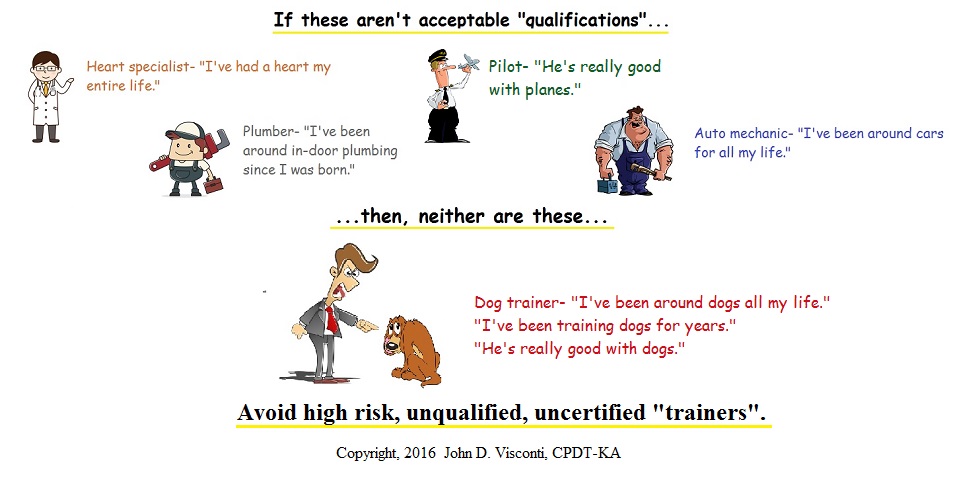Why hire a Certified Professional Dog Trainer?
Because the welfare of your family and dog or puppy are too important not to.
To become a CPDT-KA trainers must:
- Possess at least 300 documented hours of dog training experience
- Provide referrals from a veterinarian, a client, and a colleague.
- Pass a written, science-based exam to demonstrate a specific body of knowledge.
- Re-certify every three years by accumulating continuing education units.
- click here to see the advantages of working with a CPDT-KA
- I must abide by the CCPDT Code of Ethics
My Credentials/Certifications:
- CPDT-KA (Certified Professional Dog Trainer) #2112724
- Licensed Family Paws, LLC Educator
- AKC Certified Canine Good Citizen evaluator #77330
- Member APDT (Association of Professional Dog Trainers) #74163
- Former Chair for APDT Member Relations
- Charter Member, Pet Professional Guild
- Presenter Doggonesafe (Safe interactions between children and dogs)
Continuing Education Seminars/Lectures/Workshops
- Science Based Training With Feeling; Dr Ian Dunbar
- Lassie Come! Patricial McConnell, Ph. D.
- Cujo Meets Pavlov; Kathy Sdao, MA, ACAAB
- Storm & Other Phobias; Dr Nicholas Dodman
- Scent Work In Dogs; Susan Bulanda CABC
- How to Run Successful Group Classes; Rocky Boatman
- Training Dogs With Dunbar; Dr Ian Dunbar
- Feeling Outnumbered? Patricia McConnell, Ph. D.
- Behavior Problems; Dr. Ian Dunbar
- Helping Fido With Your Baby; Suzanne Hetts, Ph. D. and Daniel Estep, Ph. D.
- Walking & Heeling; Dr. Ian Dunbar
- The Art of Trick Dogging; Emily Larlham
- Positive Reinforcement Beyond Food Rewards; Johnny Angel CDBC
- For the Love of a Dog; Patricia McConnell, Ph. D.
- Dominance Theory; Pam Reid, Ph. D.
- Advanced Canine Behavior Seminar; Patricia McConnell, Ph. D.
- From Leashes to Neurons and Psychopharmacology; Karen Overall, MA, VMD, Ph. D., DACVB
- Rehabilitating the Shelter Dog; Pamela Reid, Ph. D.
- Behavioral Genetics; James Ha, PHD, CAAB
- Medications for Behavior Problems in Dogs and Cats; Louisa Beal, DVM
- Motor Patterns and their influence on breed specific behavior problems; Ken McCort

